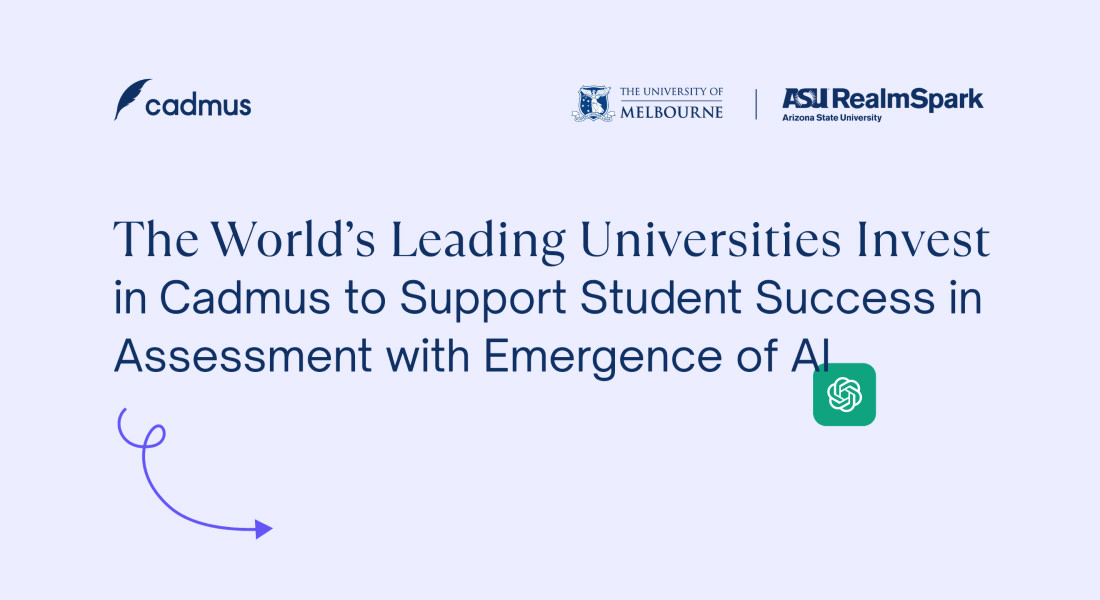Student perspectives on online learning

Over the last year and a half, the pandemic has had an enormous impact on students and the way they learn. We saw 2020 student experience scores drop significantly across all Australian universities, with satisfaction in the UK reaching an all-time low as well. On top of these survey results, we have seen constant debate over what students want from this new era of university learning — more value for money, fewer online lectures, more flexibility, and the list goes on.
To help make sense of it all, we've taken a deeper look at what students are saying — across the sector and within Cadmus — and how we can work towards improving online experiences.
What has been working well?
The EDUCAUSE 2020 Student Survey showed that 58% of students prefer some form of online learning over completely face-to-face. This may be fully remote teaching and or a mix of face-to-face and online delivery. Similar feedback was seen in an analysis of Australian student experiences by TEQSA.
Students said that 'flexibility' was the best aspect of online learning.
Students appreciated course materials being readily available and the ability to learn at their own pace. When designed well, asynchronous learning activities allowed students to manage their time across multiple subjects better. According to some providers, online learning also improved learning outcomes.
Areas for improvement
Despite the positives, students were very vocal about where they believe online learning falls short. According to TEQSA, more interaction was at the top of most students' lists. With many informal interactions before and after class no longer possible via Zoom, students felt like they didn't have enough individual time with teaching staff. While some courses included opportunities for students to work in small groups online, students felt that this did not provide the same level of enjoyment as interacting with peers in class.
Pandemic permitting, a move to hybrid teaching models may allow students to receive more in-person support and social interaction. However, for fully remote students, we must find new ways to satisfy these needs.
The worst experiences for students were "policies, practices, and approaches to teaching and learning with technology that were designed without the student experience (especially during a global pandemic) in mind" (EDUCAUSE, 2021).
This included significant criticism for online invigilation and proctoring solutions. There was plenty of media attention given to the privacy concerns of the platforms and several assessment experts recommending that online invigilation be used as a last resort.
What did we see at Cadmus?
Throughout 2020, we had more students on the platform than ever before. Looking at our in-app experience scores, student experience remained consistent or increased at all our partner institutions — on average, 86% of students have a positive Cadmus experience.
For us, this was evidence that students enjoy online learning when it is thoughtful and student-centred.
When we looked at written feedback from students, we saw this sentiment echoed. In Cadmus, students loved:
The ease and simplicity of the platform
That everything they needed for the assessment was in one place
Having larger assessments broken down into scaffolded stages
Technology that was reliable and accessible
Here are a few of our favourite comments
Love it. So much easier, especially for someone who is using an older computer.
I absolutely loved using Cadmus and felt that it was the best tool for essay writing as there was an ability to make a checklist, saved my work online, had a notes section and feedback was easier to access personally. I would recommend this for all units.
Very good! I liked how all info was in the same place and it saved automatically. Made it feel very organised!
For many subjects, we saw this positive experience translate into improvements in subject progress rates. This was encouraging to see amidst the stress and fatigue that many students felt throughout last year. Looking forward, we'll continue listening to our students as we find new ways to support them online — always being sure to show care and flexibility.

Keep learning…
The latest in teaching and learning. Delivered to your inbox.



